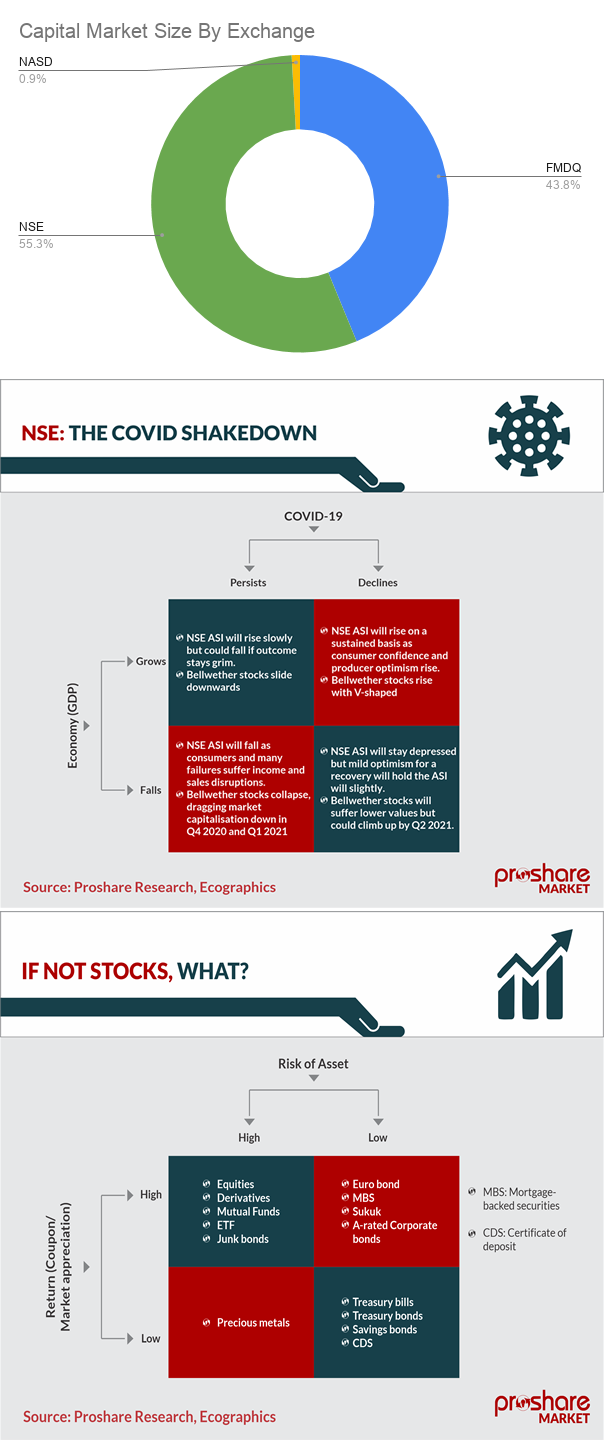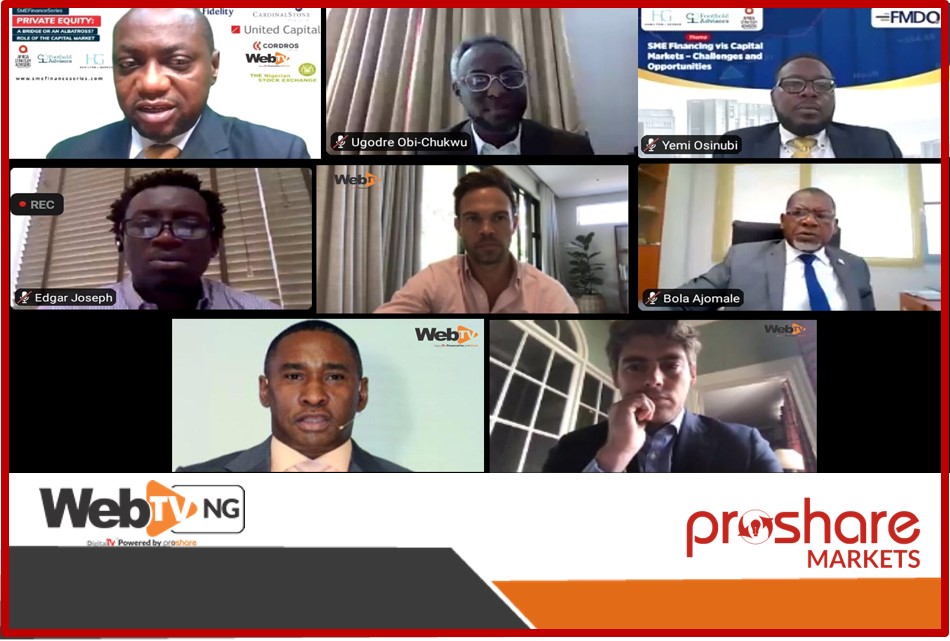Tuesday, December 01, 2020 / 10:00 AM / Nifemi Taiyesefor Proshare WebTV / Header Image Credit: WebTV
Themaiden edition of the SME Finance Series webinar themed Private Equity: ABridge or an Albatross? Role of the Capital Market convened by Mr. Joseph EdgarCo-Founder & Director, Hamilton & George Limited, Dr. Ore SofekunFounder, Foothold Advisors and Mr. Brainerd Efe Odiete Partner, Africa StrategyAdvisers brought together stakeholders who brought to the fore the significanceof the capital market in the development of Small, Medium Enterprises.
Indelivering the introductory remark, Mr. Joseph Edgar said the virtual event wasput together for the purpose of seeking solution tosourcing capital by MSMEs which would help turn the economyaround.
Hesaid that MSMEs need access to institutionalized funding, through vehicles likePrivate Equity (PE) that would enable them create wealth and jobs which is why theforum was so essential.
Inhis presentation titled 'SME funding and Entrepreneurship Development inNigeria' Dr. Nick Okoye Chairman, Nick Okoye Organization & former Executive Director NSE emphasized that beforeSMEs can thrive in Nigeria there is a need to support them and understand their ecosystem.
Hecalled for an SME capital market strategy as capital is one of the fundamentalproblems SMEs face. The strategy, according to Okoye, should cover the following areas;
- SME bond designed on a state bystate basis
- SME collective investment schemes:savings bond, equity trust, land bank trust etc.
- SME equity platform
- SME debt platform and
- Asset Backed securities and cashflow securitization
Foryoung individuals that are trying to get into the SME market post COVID-19,Dr. Nick Okoye advised them to focus on the friendly growth industries such as science, technology, engineering and mathematics (STEM), Creative Industries,Fintech and Ed tech.
Accordingto him "The strategic positioning of SMEs and entrepreneurshipwill reposition Nigeria". To support SMEs the right way, the investment banker said it was time to changeapproaches and implement alternativefunding strategies.
Furthermore,he said entrepreneurship capacity development was very important to grow SMEs in Nigeria, he emphasized constant learning and skills training which would help them build and develop.
Mr.Bola Ajomale CEO NASD Plc. In his remarks said the role of NASD was to match investors to companies ensuring transparencyin adherence with capital market best practices. He also mentioned thatmany of the companies in the tech industries havebeen very successful at raising capital.
Addressingthe structure of NASD the CEO highlighted the fact that the Exchange was geared towards growing smaller companies. To walkup the capital raise bridge, Ajomale advised SMEs toregister their businesses,document their journey, join a trade group, get due diligence advisers,identify priorities, and prepare for partners to be a part of their companies.
Alsospeaking at the Webinar Mr.Jude Chiemeka the Divisional Head ,Trading Business, The Nigerian Stock Exchange(NSE) revealed that as policy makers brainstorm on ways tostimulate the economy providing liquidity to support SMEs, it is a verysignificant step because of their role as economic catalysts.
"Nigeriahas a total of 41.5 million micro, small and medium enterprises that constitutethe growth sector, in 2019 SMEs also accounted for about 7.27% of goods andservices exported out of Nigeria" he said.
Chiemekacited a PwC Nigeria report that estimated the yearly financial gap for NigerianSMEs at N617.3billion as at the end of 2019. He noted that under the rightcorporate structures and platforms these liquidity pools can plug the financinggap for SMEs and also the NSE Growth Board, creates a platform for SMEs to connectwith this liquidity pool.
Speakingfurther he stressed that the NSE Growth Board is an initiative designed to meetthe needs of fast-growing companies such as SMEs.
Speakingon the benefits of Growth Board toIssuers DH Trading Business, the NSE Divisional Head Trading Business said ithelps to ensure increased corporate governance while providing the necessarysupport mechanism/framework for sustainability.
Lookingat "Unlocking the Nigerian Capital Markets for SMEs: A Roadmap" Mr. Oye Onwuka,Ag. MD, FMDQ Private Markets, said 90% of Nigerian businesses are SMEs whichcontribute 84% of total employment and 48% of GDP contribution and as suchshould not be neglected.
"Nigeriastands to gain significantly fromthe product and service valuewhich SMEs, if supported, could bring to the economy; finding solutions to revitalizing and deepening thesector must be afront burner bun" Onwuka said.
Sheddingfurther light on fundingsources he stated that 48% of family and friends are the most popularfinancing sources, 15% are obtained through short term credit facilities andonly 0.3% of commercial banks credit is available to SMEs. The challenges thatSMEs face come under the broad umbrellasof governance, payments, financing and scaling.
TheAg. MD, FMDQ Private Markets highlighted that governance, separation, businessstructure, discipline, transparency, management, business drivers and servicesare key indicators on the roadmap for SMEs to access capital through theFMDQ.
Mr.Brainerd Efe of Africa Strategy Advisers inhis comments emphasized that thecultural perception/barriers around SMEs needs to be addressed through engagingthe key business players. He opined that if the capital market operatorscan be more feasible then growth can be spurred.
Alot more around financial education needs to be done as he stated that businessadvisers and financial experts need to play a key role in explaining to smallbusinesses complex financial terms andprovide them with other forms ofsupport.
Givingher closing remarks, Dr. OreSofekun advised SMEs to consider the importance of starting a business with the right framework andthereafter buildingon the proper foundations which wouldsteer such business along the pathof sustainability.
Thewebinar featured the following speakers Mr. Paul Calvey Partner, Head of SouthAfrica, Oliver Wyman, Mr. Olumide Bolumole Divisional Head, Listings BusinessNSE, Mr. Archie Stebbings Partner, Head of Market Infrastructure Risk, OliverWyman, Mr. Yemi Osinubi Head, Private Capital, FMDQ Private Markets Limited, Mr. Ugodre Obi-Chukwu Co-founder Nairametrics and CMO Ikeja Electric, and Mr. Teslim Shitta-Bey,Chief Economist/ManagingEditor of Proshare who moderated the panel session.

Related News
1. The Sunny Disposition of PrivateEquity in Today's COVID-19 World
2. FMDQ, NASD, and NSE Lead Conferenceon SME Financing via the Capital Markets
3. FBNQuest Spotlights Private Equityas a Viable Alternative Asset Class
4. Finance Act, 2019: Tax Implicationsfor the Private Equity Industry
5. The Strange Absence of theInstitutional Investor
6. Experts Review the Impact ofCOVID-19 on Corporate Finance and The Future
7. IOSCO Report Provides New Data on GlobalHedge Fund Industry
8. A Practical Guide To CapitalRaising For African Companies And Entrepreneurs
 Lagos, NG • GMT +1
Lagos, NG • GMT +1











 1187 views
1187 views









 Sponsored Ad
Sponsored Ad
 Advertise with Us
Advertise with Us









